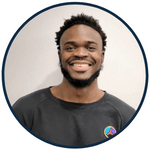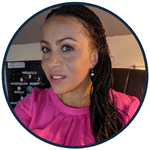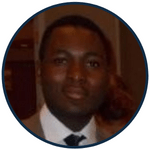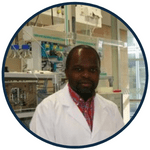Black History Month 2022: overcoming hurdles

We are celebrating Black History Month by interviewing those who are a part of the Black community and work within the field of STEM, as we want to allow more diverse voices to be heard and acknowledge those whose achievements need honoring.
In this piece, we are focusing on the struggles people have faced working within STEM whilst building their careers and how they have overcome these hurdles. We posed the question:
‘In relation to diversity and inclusivity, what hurdles have you had to overcome?’
 Nicole Fleming, PhD
Nicole Fleming, PhD
Scientist II/Bioanalytical Project Manager
Bioagilytix (NC, USA)
Moving to the U.S. for my post-bac and PhD programs was a bit of a culture shock. Being born and raised in the Caribbean, as a Black woman, I was a part of the majority. I also attended a historically black college and university (HBCU) in the region for my undergraduate studies. It helped that I completed summer research internships on the mainland, throughout my time in undergrad. However, a mixture of imposter syndrome and the lack of sufficient representation of Black people in leadership positions within STEM, particularly in academia and industry, were hurdles that I had to overcome. I have had feelings of ‘I did not belong’ and thoughts of ‘I have to do more and work harder to prove myself’. These feelings were caused by both internal and external pressures. As a Black female scientist, sometimes it feels like there is a different level of expectation, and not in a good way. Despite expectations being met, sometimes, the benefits are not comparable. Imagine situations where a PhD is a hurdle rather than a key.
 Maria Dixon, PhD
Maria Dixon, PhD
Scientist Training Program Manager
Bioagilytix (NC, USA)
Transitioning from a historically black college and university (HBCU) to a predominately White institution was a cultural adjustment. As one of two African American doctoral students, I raised my expectations and standards to succeed in a competitive and challenging program as a minority. As the only Black female student, I felt the need to exceed expectations and prove that I was deserving. Although most of my professors were supportive and inclusive, I often felt imposter syndrome and my integrity was questioned, due to my academic excellence. As a Black female scientist, I have overcome implicit biases, stigmas and have succeeded professionally in a predominately White male profession.
 William Njoh-Paul
William Njoh-Paul
Lab Analyst
ICON plc (KS, USA)
I would say coming from a different part of the world and having to adapt, not only to the environmental changes, but also the cultural diversity of the United States was definitely a major hurdle I had to overcome. Moving away from home at a pretty early age, everything from my accent to my understanding of race and inclusivity was different. It definitely took some time to adjust and assimilate to my new environment, but it got easier with time.
 Tinaya Gray
Tinaya Gray
Senior Director, Project Delivery
ICON plc (NC, USA)
Early in my career, there were a few challenging things I can recall – being the only or one of a few in the room. This was dually impactful being both Black and a woman. There was a difficulty relating personally to most of my early managers and leaders before I understood the power of creating your network. Over time, I’ve seen tremendous changes that are encouraging, in the last 5 years I’ve seen more women and people of color in leadership positions than ever before. The more we see it, the more (hopefully) we will know that we belong. Dr Kizzmekia Corbett (a Black female scientist and researcher previously with National Institutes of Health (MD, USA) and now with Harvard University (MA, USA)) had the primary role in creating one of the COVID-19 vaccines currently approved in the US – hopefully, the ‘firsts’, the ‘onlys’ and the surprise will continue to wear off and we will expect to see diversity in all of our spaces because, ultimately, our goal is to advance public health for all.
 Rebecca Wates, PhD
Rebecca Wates, PhD
Senior Program Manager
KCAS (KS, USA)
As a first-generation college graduate and the first person in my family to earn a PhD, it has often been difficult to chart my path. Where my peers have parents or relatives with extensive collegiate networks, resources and knowledge, I’ve had to learn by bumping my head. However, my challenges have forged in me the ability to teach myself nearly anything. During my graduate, post-graduate training and professional journeys, I found that I had to prove my value at every turn, while others received the benefit of the doubt. Truthfully, as a result, I struggle with imposter syndrome and continue to find ways to push the self-doubt aside and move forward.
 Brennon Marcano,
Brennon Marcano,
Chief Executive Officer
The National GEM Consortium (VA, USA)
Being an underrepresented minority in STEM, I have had many hurdles to overcome. When I worked in the private sector, there were very few folks that looked like me, and that immediately created a mental barrier because you start questioning whether there is a career pathway for yourself. Also, back then, the few minority folks that were in senior positions were hesitant to use their political equity to help others. I had to make a conscious effort to remove myself out of my comfort zone and seek allies and supporters that did not look like me. For someone early in their career, that can be very intimidating. Also, back in my day, diversity and inclusivity weren’t a strategic priority, it was still a compliance issue that over time slowly evolved into an ‘it’s the right thing to do’ approach. None of which really resonated at the ‘C’ suite level and so it wasn’t as highly sought after as it is now. However, I think the biggest punch to the gut was seeing non-minority peers get promoted quicker than yourself and wondering what I had to do to get a fair chance. These are things that can be hard to overcome.
 Blessing Okai
Blessing Okai
Lab Data Analyst
Q2 Solutions (Aberdeen, UK)
I just moved from Nigeria to the United Kingdom 16 months ago, in 2020, and so most of my career has been in a Black nation. In that respect, I didn’t face any hurdles when seeking opportunities because of the color of my skin. However, moving to the UK, I think the major hurdle I faced was believing that I was good enough to excel in school and compete against native locals in the job space. I have always been an intelligent person and was sure of my capabilities but entering into a new environment where things were done differently, I felt out of depth. I got turned down by a lot of recruiters but understood it was part of the job search process. Other than that, it’s been smooth sailing; I received a lot of support from my colleagues at school until I graduated. Where I work presently, my teammates and superiors have been amazing. I feel like I have a voice and am heard. It’s been an amazing journey so far.
 René Fuanta
René Fuanta
Biochemist and Assistant Professor
East Stroudsburg University of Pennsylvania (PA, USA)
One main challenge in this area has been in coaching and mentoring minority students, especially first-generation. Many play the roles of older siblings, and to some extent act as parents and breadwinners, straining their inability to focus on their educational advancement. Many parents of first-generation students lack the experience of applying for financial aid. This poses a significant problem for students, as the process can oftentimes be complicated for first-time students. I have attempted to circumvent this by having frequent meetings with students, advising them on potential career paths, working through financial aid, time management, etc. This has had a very positive impact on students’ commitment to their success in science.
The burden of the ‘minority tax’. These extra responsibilities include, but are not limited to, training, mentoring minorities, the inequalities of the tenure track system, etc., which all pose a significant hurdle to minority faculty. These make achieving a work-life balance seem next to impossible. As a minority faculty, I resulted in selecting the avenues where I invest a significant amount of my time, whether or not it counts towards tenure. Training and mentoring, to me, are a priority and students are more impacted to make significant progress towards their degree.
 Olivier Heudi
Olivier Heudi
Laboratory Head
Novartis Pharma AG (Basel, Switzerland)
Certainly, one of the major hurdles is your ethnicity. As a matter of fact, people still have in their minds that Black individuals are good in sport, that they can run a marathon in less than 2 hours, or that the only thing that they can perform are routine tasks such as cleaning, dishwashing, etc. This perception is reinforced by the fact that one can barely see Black people in so-called high management positions. How many CEOs of the big pharmaceutical companies are Black? In addition, even within their countries in such places as Africa, for example, it seems like they do not have the chance to be nominated at a very high position. Hence, you may only see a very little portion of locals placed at high-level positions with responsibility within larger companies. This might not be what you see in other continents such as Asia or South America for example. All these prejudices and the lack of trust make it difficult for a Black individual to be equally treated within a company. I must admit this is now evolving, but it will still take some time to change the mentalities in the Occident. Consequently, as a Black individual, you have to constantly demonstrate that you can do what you were hired for.
 Wonu Adebimpe
Wonu Adebimpe
Senior Scientist
Recipharm (Queenborough, UK)
I have wanted to change the general perception of the work ethic of an African by challenging myself to always be the most knowledgeable and proficient worker in any room I find myself in. An added advantage for me is I usually read about the company, its environment and management before resumption at the company. Also, I position myself within a culture of continuous improvement whilst on the job with a goal to achieve the pinnacle of the management/professional ladder.
